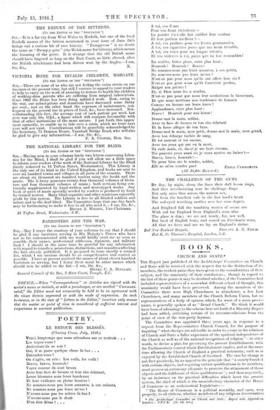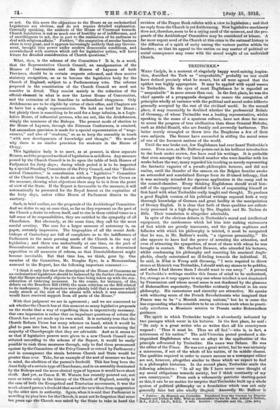BOOKS.
CHURCH AND STATE.* Tim Report just published of the Archbishops' Committee on Church and State will be received wiiit the respect duo to the distinction of its members, the evident pains they have given to the consideration of their subject, and tho unanimity of their conclusions ; though in regard to the last of these points it may be doubted whether, if the Committee had included representatives of a somewhat different school of thought, this unanimity would have been preaerved. Among the members of the Committee there were High Churchmen in abundance, a few Low Churchmen, and many members of the Church Reform Union, but no representatives of a body of opinion which, for want of a more precise name, is generally spoken of as " Broad Church." We think it would have been of advantage to the scheme here set forth if a Minority Report had been added, criticizing certain of ito recommendations from the point of view of the non party layman.
The Committee was appointed three years ago, in response to a request from the Representative Church Council, for the purpose of inquiring " what changes are advisable in order to occur° in the relations of Church and State a fuller expression of the spiritual independence of the Church as well as of the national recognition of religion "—in other words, to devise a plan for preserving the present Establishment, with the Parliamentary control which Establishment implies, and at tho same time allowing the Church of England a practical autonomy, such as is enjoyed by tho Established Church of Scotland. The case for change is put first positively, by an appeal to the principle that " a society foundcl with certain objects, and requiring certain qualifications in its members, must possess an autonomy adequate to promote the attainment of those objects and the fulfilment of those qualifications" ; and then negatively, by an insistence on the practical difficulties which beset the present system, the chief of which is the unsatisfactory character of the House of Commons ac an ecclesiastical Legislature:- " The House of Commons is a political assembly, and open, very properly, to all citizens, whether members of any religious denomination
• The Archbishops' Committee on Church and Stare: Repot wills Appendices.
London : S.P.C.K. Cd. net.]
or not. On this score the objections to the House as an ecclesiastical Legislature are obvious, and do not require detailed explanation. Generally speaking, the attitude of the House of 'Commons towards Church legislation is not so much one. of hostility as of indifference, and of unwillingness to act, due in part to the realisation of its unfitness to deal with religious-affairs." Further, " the congestion of secular business alone is very great, and it appears increasingly unlikely that any Govern- ment, brought into power under modern democratio conditions, and overwhelmed with matters which call for legislative action, will have leisure for detailed consideration of Church questions."
What, then, is the scheme• of the Committee? It is, in .a word, that the Representative Church Council, an amalgamation of the
- Houses of Convocation -and the Houses of Laymen of both Provinces, should be in certain respects reformed, and then receive a-tatI:tory recognition, so as to become the legislative body for the Church of England, subject to a Parliamentary veto. The reforms proposed in the constitution of the Chun% Council we need not consider in detail. They consist mainly in the reduction of the officialt element in what is now the Lower House of Convocation, and the extension of its franchise to unbeneficed clergymen. Only Archdeacons are to be eligible.by virtue- of their office, and Chapters are to have but a single representative. We hold no brief for Deans ; but plainly there is something to be said for a large infusion, in a Legis- lative House, of influential persons, who are not, like the Archdeacons, simply the nominees 9f the Bishops. The present mode of election to the House of Laymen, through the Diocesan Conferences, is retained, bIst. ;anomalous provision is made for a special representation of "wage- earners," and also of "students," so as to keep the assembly in touch ". with new developments of knowledge and thought." We wonder why there is no similar provision for students in the House of Clergy.
This legislative body is to meet, as at present, in three separate Houses, and the proposed method of legislation is aafollows. Any measure Passed by the Church Council is to lie upon the table of both Houses of Parliament for ,forty days ; during which period it is to be inspected by especial Standing Committee of the Privy Council, and this "Ecclesi- astical Committee," in consultation with a " legislative " Committee of the Church Council, is to draft an advisory Report to the Crown on the measure, showing what objections there may be to it from the point of vied, of the State. If the Report is favourable to the measure, it will automatically be- presented for the Royal Assent at the expiration of the forty days, unless either House of Parliament directs to the contrary.
Such, in brief outline, are the proposals of the Archbishops' Committee. And we deffire to say at once that, so far as they represent on the part of the Church a desire' to reform itself, and to rise in these critical times to a full sense of its responsibilities, they are entitled to 'the sympathy of all Churchnien. But obviously, at the same time, they call for the most careful scrutiny. The case for a larger measure of autonomy is, on paper, certainly impressive. The biographies of all the recent Arch- lishops of Canterbury are full of complaints as to the indifference of Parliament to the most pressing needs of the Church in the way of legislation ; and there was undoubtedly at one time, on the part of Nonconformist members of the House of Commons, a determined opposition to all measures of reform, -so that Disestablishment might become inevitable. But that time has, we think, gone by. One member a the Committee, Mr, Douglas Eyre, in a Memorandum= annexed to the Report, has the following important comment :—
" I think it. only fair that the description of the House of Commons as an ecclesiastical legislature should be balanced by the further observation: that-the Housenaturally objects to its time being taken up with the con-. sideration of tinkering measures. In the course, for instance, of the debate on the Benefices Bill (1895) the main criticism on the Bill related to its inadequacy. Its promoters were plainly told that a measure which' really struck at the root of the abuses with which it was concerned! would have received support from all parts of the House."
With that judgment we are in agreement ; and we are concerned to- ask whether the Church has at this moment so many legislative proposals ' on the stocks that a way of expediting them is imperatively necessary. Our own impression is rather that on impoitant questions of reform the Church has not yet made up its own mind. It is certainly true that the Church Reform Union has many schemes on hand, which it would be glad to pass into 'law, but it has not yet succeeded in convincing the majority of Churchpeople that they are advisable. And so it seems to us that if legislative powers were given to a new Church Council con- stituted .according to the scheme of the Report, it would be easily' posiiibki -to rush these measures through, only to find them pronounced' against by the Committee of the Privy Council or vetoed by Parliament ;- and in consequence the strain between • Church and State would be greater than ever. Take, for an example of the sort of measure we have' in mind, the abolition of the parson's freehold. This has long been the. Aunt Sally of a certain type of Churchman, and in an assembly dominated by the Bishops and the more clerical type of layman it would have short- shrift. And yet, as Canon E. W. Watson has recently pointed out, not- once or twice only in the history of the Church of England, notably in the case of both the Evangelical and Tractarian movements, it was the much-abused parson's freehold that saved the new ideas from suppression by the older men in authority. Again, when it is said that Parliament is unwilling to pass laws for the Church, it must not be forgotten that some ten years ago the Church was asked by the State to take in hand the
:revision of the Prayer Book rubrics with a view to legislation ; and that no reply from the Church is yet forthcoming. New legislative machinery does not, therefore, seem to be a crying need of the moment, and the pro- .posals of the Archbishops' Committee may'be considered at leisure. A far more urgent need of the Church at this crisis in the national history is the diffusion of -a spirit of unity among the various parties within its :borders ; so that its appeal to the nation on any matter of political or .social consequence may come with the moral weight of an undivided' Church.































 Previous page
Previous page